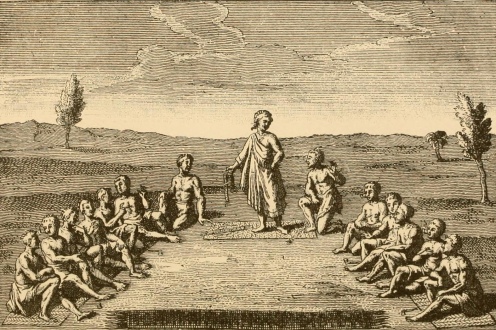Karl Marx and the Iroquoi (Rosemont, 1989)
by Franklin Rosemont, 1989, in Arsenal: Surrealist Subversion
There are works that come down to us with question-marks blazing like sawed-off shotguns, scattering here and there and everywhere sparks that illuminate our own restless search for answers. Ralegh’s so-called Cynthia cycle, Sade’s 120 Days, Fourier’s New Amorous World, Lautremont’s Poesies, Lenin’s notes on Hegel, Randolph Bourne’s essay on The State Jacque Vaches War letters, Duchamp’s Green Box, the Samuel Greenberg manuscripts: These are only a few of the extraordinary fragments that have, for many of us, exerted a fascination greater than that of all but a very few “finished” works.
Karl Marx’s Ethnological Notebooks[1] -notes for a major study he never lived to write, have something of the same fugitive ambiguity. These extensively annotated excerpts from works of Lewis Henry Morgan and others are a jigsaw puzzle for which we have to reinvent the missing pieces out of our own research and revery and above all, our own revolutionary activity. Typically although the existence of the notebooks has been know since Marx’s death in 1883, they were published integrally for the first time only eighty-nine years later, and then only in a highly priced edition aimed at specialists. A transcription of text exactly as Marx wrote it- the book presents the reader with all the difficulties of Finnegan’s Wake and more, with its curious mixture of English, German, French, Latin and Greek, and a smattering of words and phrases from many non-European languages, from Ojibwa to Sanskrit. Cryptic shorthand abbreviations, incomplete and run-on sentences, interpolated exclamations, erudite allusions to classical mythology, passing references to contemporary world affairs, generous doses of slang and vulgarity; irony and invective: All these the volume possesses aplenty, and they are not the ingredients of smooth reading. This is not a work of which it can be said, simply, that it was “not prepared by the author for publication”; indeed, it is very far from being even a “rough draft?’ Rather it is the raw substance of a work, a private jumble of jottings intended for no other eyes than Marx’s own-the spontaneous record of his “conversations” with the authors he was reading, with other authors whom they quoted, and, finally and especially, with himself. In view of the fact that Marx’s clearest, most refined texts have provoked so many contradictory interpretations, it is perhaps not so strange that his devoted students, seeking the most effective ways to propagate the message of the Master to the masses, have shied away from these hastily written, disturbingly unrefined and amorphous notes.

No comments:
Post a Comment